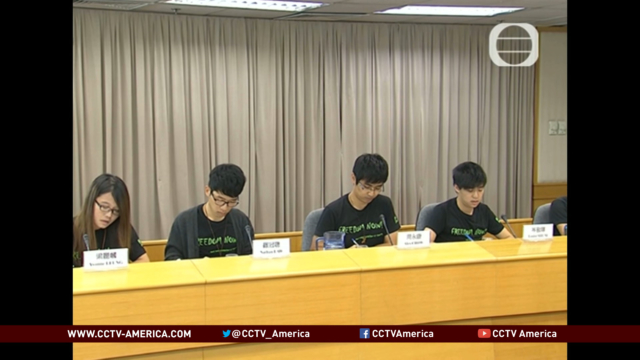In Hong Kong, representatives of the government and student-led protesters wrapped-up a first round of talks. Although there were no breakthroughs, Hong Kong agreed to report student appeals directly to Beijing. CCTV America’s Xing Zheming and Zhang Nini report.
During the two-hour long talks, representatives from the Hong Kong SAR government and the Federation of Students, who helped organize the Occupy Central movement, exchanged views and expressed their respective hopes for a better future for Hong Kong.
During the talks, the students, while demanding answers, also showed a desire to find what’s best for Hong Kong’s development. Responding to the protesters’ demand for changes to the Basic Law, the SAR’s Chief Secretary for Administration, Carrie Lam, said Hong Kong will reform its electoral system, but that will require time and should be carried out gradually.
“We simply cannot have ideals only. We have to have regards to reality. Hong Kong is a special administrative region under the “One country, Two systems”, so we have to measure to the constitutional requirements,” said Lam.

Lam also proposed four points to advance Hong Kong’s constitutional development. First, she said the SAR government will conduct a second round of public consultations in a fair, transparent and open way, to ensure that all opinions are heard. And five specific steps will be followed in the coming years to improve Hong Kong’s electoral system. A platform will also be established to allow students to become better involved. Finally, a report will be released that gathers all public opinions.
Lam promised that the SAR government will not submit an additional report to the Standing Committee of the National People’s Congress (NPC), China’s top legislature, as requested by the protesters, but will directly report to the central authorities on appeals made by the students.

Lam said the government has conducted a careful consultation on the region’s constitutional reform, and the report submitted by the chief executive has taken into consideration the views of all circles in Hong Kong.
She did not agree that the election under the framework of the NPC’s decision is adopting a “hand picking” approach, adding that the election method is not ultimate and there are still rooms for discussion according to the actual situation and public opinions.
The SAR government will set up a platform for people to discuss Hong Kong’s constitutional development after 2017 in a bid to seek a consensus on the issue, she added.
History of Protest
CCTV America’s Jim Spellman explains how the city came to be known in China as the “Hong Kong Special Administrative Region.”

Story compiled with information from CCTV America, Xinhua, and the Associated Press.
 CGTN America
CGTN America
